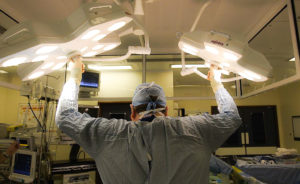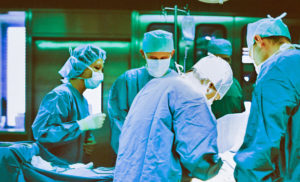The idea that doctors are saints is relatively new. For much of the 19th century, they were held in pretty low regard by the general public. Some were seen as social climbers — men using their medical training to get closer to wealthy patrons and pay their way into the middle classes — others as grifters, selling useless pills and nostrums to desperate patients. William Hogarth, in the late 18th century, and James Gillray in the early 19th, showed little mercy towards doctors, making a mockery of medicine in their satirical cartoons.
The 21st century narrative couldn’t be more different. To mark the National Health Service’s 70th birthday, in 2018, Nicklaus Thomas-Symonds wrote a new preface to his biography of its architect, the Labour MP Aneurin Bevan. Like most contemporary paeans to the NHS, Thomas-Symonds’ lavishes praise on its staff, both past and present. “Those who work in our National Health Service have made it what it is today,” he wrote, “and we should always thank them for their remarkable commitment to public service, often carried out in the most difficult of circumstances.”
This view of the NHS, which turns 75 this week, is even more pervasive now than it was then. During the pandemic, politicians, journalists, and patients commended the devotion of doctors with such regularity that it became cliché. Most discussions of healthcare in the UK present NHS workers as heroes, or at the very least unusually committed to their jobs. The recent news that doctors will be taking industrial action this month has been framed by the sympathetic press as a difficult decision made in the interest of patients’ safety. Supporters on social media argue that the medical profession is driven not by personal greed, but by its unwavering commitment to the British public. In February, Jeremy Corbyn repeated a familiar claim: “Doctors devote their lives to the needs of others.” Medicine is not like other professions, the story goes; working for the NHS is different from any other job. Unlike the rest of us, they don’t do it for the money, they do it because they care.
All this seems complimentary. The people praising NHS doctors are sincere, often expressing gratitude for care they’ve personally received. But the insistence that doctors are saints actually does a lot of damage. Not only does it harm medics themselves, it also does a disservice to patients.
The origin of the myth lies in the 19th century, when doctors launched something of a PR campaign to give their image a dramatic makeover. They marketed themselves as different from the quacks with whom they were competing for patients in a busy medical marketplace. Trainee physicians were reminded perpetually that the medical “calling” was very different from that of other professions. In 1890, Governor J. Proctor Knott issued the doctoral address to the graduating class at the Kentucky School of Medicine: “No other calling,” he said, “demands a more absolute self-negation than the one you have chosen. No other vocation — not even the sacred ministration of religion itself — requires a more constant exercise of the higher faculties of the human mind, or a more earnest devotion of the purer and nobler attributes of the human soul.”
By the end of the century, medical organisations had begun to describe their work using the romantic language of heroism. In 1900, surgeon Frederick Treves spoke at the annual meeting of the BMA, using military rhetoric to describe his profession: “So as one great surgeon after another drops out of the ranks his place is rapidly and imperceptibly filled, and the advancing line goes on with the still same solid and unbroken front.”
Despite these efforts, the poor reputation of doctors survived into the 20th century. In 1937, A. J. Cronin published his novel The Citadel — an attack on self-serving healthcare professions. He particularly targeted those at the top of the medical hierarchy, the “grandees” whose driving concern was money, and who encouraged illnesses in their “wealthy, idle, hypochondriac, and mostly female patients”. The Citadel was an extraordinary success, selling over 150,000 copies in its first few months. Clearly, it struck a chord with the British public.
Just over a decade later, on 5 July 1948, the NHS was founded. It did a huge amount for the medical profession’s reputation, though not initially. The BMA was one of the most vociferous opponents of the proposed NHS, not wanting medics to be relegated to the status of “salaried” workers. “The medical profession is,” declared the BMA, “opposed to any form of service which leads directly or indirectly to the profession as a whole becoming full-time salaried servants of the State.” Nye Bevan had to “stuff their mouths with gold” to get them on board: he allowed consultants to continue taking on private patients as well as NHS ones.
The mythical status of the NHS we recognise today didn’t emerge until later, in the early Seventies — in part due to the decade’s economic and political pressures, which prompted people to campaign in defence of the welfare state in ways they hadn’t felt they needed to before. The myth was also a product of subtle but deliberate NHS propaganda, in the form of TV hospital dramas, nurse recruitment films, and medical romance fiction.
As the health service grew in popularity, the public image of medics also slowly improved. But in 1978, their freshly-minted reputation was put to the test, when NHS doctors first went on strike over pay and working conditions. Indeed, some doctors were opposed to their colleagues taking industrial action, because they thought it compromised their high-minded principles. A consultant surgeon wrote in 1976: “Doctors have to decide whether medicine is to remain a profession with ethics or to become an industry with strictly regulated hours of work.” He criticised the strikes by arguing that the withdrawal of services would “make nonsense eventually of any idea of vocation”, which was “over and above job satisfaction”. That same year, another consultant wrote to the government to argue against industrial action, which had “immediately put the doctors on a par with the trade unions and other workers”. These ideas are still around. In 2016, the Telegraph argued against industrial action by junior doctors because their “vocation in life” is “to care”. Imagine saying the same thing of the striking civil servants.
Then again, it does make sense for healthcare professionals to think of themselves in these terms. Many medics really do feel a sense of devotion to their profession and to their patients. They do often take an oath. And if doctors couldn’t cling onto the idea of exceptionalism, would any of them stay in the job? During the height of the pandemic, doctors and nurses were working impossible hours, under extreme pressures, and the very real risk of serious illness or death loomed over them. One in ten health workers in England during the pandemic had suicidal thoughts. There is still a palpable crisis of wellbeing among NHS staff, pay has stagnated, and the number of doctors fleeing the UK in search of better jobs elsewhere has sky-rocketed. And Rishi Sunak’s plan to boost the workforce, announced on Friday, seems squeamish of acknowledging the true challenges to retention. Is it any wonder that doctors try to find meaning in a romantic ideal of their work, rather than just focusing on the day-to-day drudgery and dehumanisation that so often characterises employment in the NHS?
But politicians who characterise doctors as saints often do so to deny their right to industrial action. They don’t need better pay or working conditions, or so the argument goes, because their jobs are so meaningful. Members of the public who buy into the myth, even if they are well-meaning, obscure the bleak state of the NHS. During the pandemic, we clapped for health workers because there was little else we could offer them. You could text CLAP to 70507 to donate £5 to NHS charities, knowing that the service itself was inadequately funded. The public was unable to provide the NHS staff with the protective equipment they so desperately needed — but it could tell them they were heroes.
Doctors cannot live on saintliness alone. Poor pay and conditions means it is often hard for medics to stay professional — let alone heroic. How can you devote yourself to patients, or even show them compassion, when you can only speak to them for seven minutes at a time? In 2022, 51 million GP appointments lasted less than five minutes. 94% of NHS doctors surveyed said short appointment times put patients at risk and one in three GPs admitted they have failed to properly diagnose patients due to time constraints.
We also need to recognise that some doctors are bad at their jobs, no matter how much time and money they’re given — just as some teachers and civil servants are also no good. But the medical profession’s glowing reputation makes it hard to confront this fact. While doctors are frequently targets of abuse, sometimes they treat their patients poorly. Not all doctors are competent, and their vaunted position in today’s society can make it a lot harder for patients to have their complaints heard, for abuses to be taken seriously, and lasting improvements to be made. In 2013, the NHS Ombudsman found that patients were often “too frightened to complain” about problems with their care.
Doctors are just people. If we just thought of them not as heroes but simply as skilled professionals doing their jobs — sometimes well, sometimes not so well, sometimes in impossible circumstances — we could level out the power dynamic between them and patients, making it easier for the latter to get their voices heard. Doctors, too, would be better equipped to advocate for themselves. And the NHS as a whole might be forced to stop falling back on the myths of medicine’s heroism, stop relying on its workforce’s goodwill, and reckon with the radical reforms needed to make the service fit for purpose in its 75th year. Some doctors might be reluctant to let go of their romantic ideals. But surely a slight drop in social status is a price worth paying for a comfortable working life?
Disclaimer
Some of the posts we share are controversial and we do not necessarily agree with them in the whole extend. Sometimes we agree with the content or part of it but we do not agree with the narration or language. Nevertheless we find them somehow interesting, valuable and/or informative or we share them, because we strongly believe in freedom of speech, free press and journalism. We strongly encourage you to have a critical approach to all the content, do your own research and analysis to build your own opinion.
We would be glad to have your feedback.
Source: UnHerd Read the original article here: https://unherd.com/




